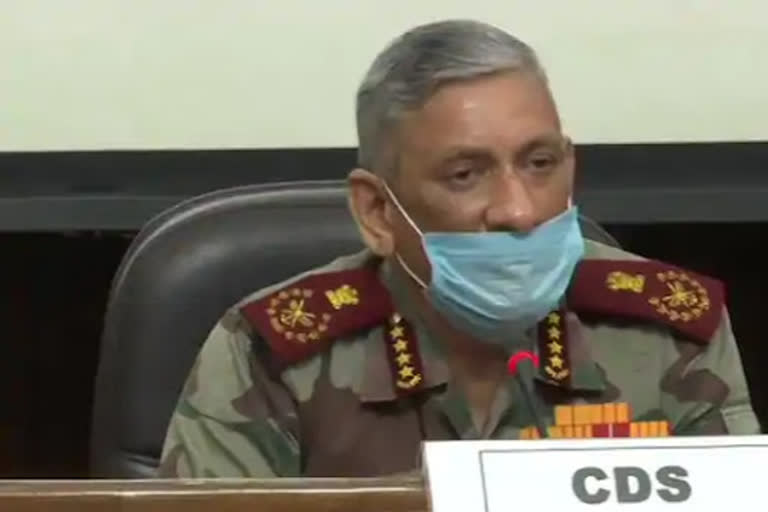New Delhi: In the emerging defence paradigm, India's security would be maintained not only along the northern and western borders but in the strategic space of the extended neighbourhood as well, Chief of Defence Staff General Bipin Rawat said on Saturday.
He also said that India values its emerging relationship with the US and cherishes its traditional relationship with Russia, adding that the nation shares a mature and robust defence and security framework with both these powers.
Addressing a symposium on defence exports, General Rawat said that the armed forces will have to work through the budgetary constraints by finding the best solutions through new acquisitions and optimisation considering the macro-economic parameters.
Referring to proposed reforms in the military structure, General Rawat said that the Chief of Defence Staff and the theatre commanders would 'conjointly' provide unity of command while the service headquarters and the 'component commanders' could provide unity of effort.
Under a big-ticket reform initiative, India is working on setting up of several theatre commands, integrating some of the commands of the three services, to deal with future security challenges facing the country.
Read:| India has 'military options' to deal with Chinese transgressions if talks fail: CDS Rawat
Each of the theatre commands will have units of the Army, the Navy and the Air Force and all of them will work as a single entity looking after security challenges in a specified geographical territory under an operational commander.
The government had appointed General Rawat as India's first Chief of Defence Staff on December 31 last year to bring synergy in the functioning of the three services.
Talking about the regional security paradigm, he touched upon key aspects of India's security doctrine. In this context, he mentioned International Border (IB) and Line of Control (LoC) with Pakistan as about Line of Actual Control (LAC) with China.
"In the emerging security paradigm, India's security would be maintained not, as hitherto, on the IB, LC or the LAC alone, but in the strategic space of the 'extended neighbourhood' and the strategic frontier'," he said without elaborating further.
India has been ramping up defence and security ties with many countries in its extended neighbourhood like Indonesia, Singapore and several countries in the Gulf region in the last few years.
Delving into the evolving security matrix in the region, the Chief of Defence Staff pitched for seamless integration of surveillance and communication resources of the three services, saying such a convergence is essential for evolving a framework for having a composite real-time air situation "picture".
Read:| India's armed forces fully capable of dealing with Chinese actions: Gen Rawat
General Rawat said robust interaction between the CDS, COSC (Chairman of the Chiefs of Staff Committee) and political executive (Cabinet Committee on Security) must ensure single-point military advice, strategic direction and resource optimisation.
On the modernisation of the Indian Armed forces, he said it has been in line with the changing global security environment and with a focus on the utmost optimisation of resources.
"We are witnessing seismic changes in geopolitics shaped by a 'nation first' approach and geo-economics," he said, adding the armed forces should be structured in a manner that they provide the operational flexibility to pursue "wider strategic objectives".
The nation's first CDS also said the pursuit of disruptive technologies like artificial intelligence, robotics, big data analytics, drone technology, militarisation of space, quantum communications, along with manipulation of social media is leading to new threats, and further complicating the security environment.
He said that the asymmetric advantages created by unmanned aerial vehicles (UAVs) are being seen as opportunities by non-state actors, adding future defence systems must be qualitatively and quantitatively capable of dealing with the new threats.
"In this era of multidimensional technology, we must focus on constant innovations and modern technological solutions, to keep ourselves ahead of the adversaries," he said.
General Rawat said the creation of the Department of Military Affairs headed by the CDS, having a central staffing scheme along with amendments to the business rules, in effect, admits the military into the central edifice of the government of India.
"This restructuring of the Ministry of Defence allows us to embrace forward-looking strategies to seize and exploit the moment and set in motion a dynamic transformation process," he said.
PTI report



